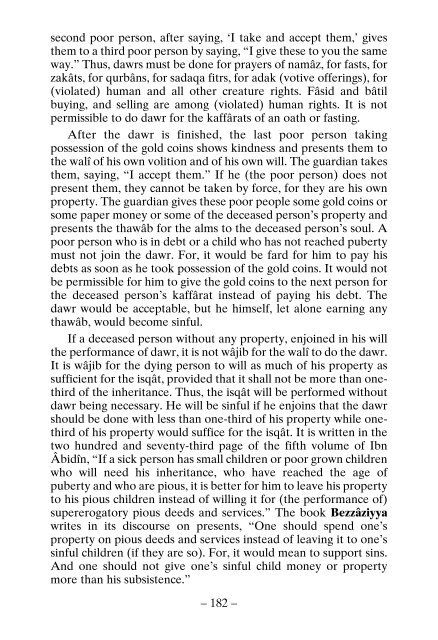Book of Namaz
You also want an ePaper? Increase the reach of your titles
YUMPU automatically turns print PDFs into web optimized ePapers that Google loves.
second poor person, after saying, ‘I take and accept them,’ gives<br />
them to a third poor person by saying, “I give these to you the same<br />
way.” Thus, dawrs must be done for prayers <strong>of</strong> namâz, for fasts, for<br />
zakâts, for qurbâns, for sadaqa fitrs, for adak (votive <strong>of</strong>ferings), for<br />
(violated) human and all other creature rights. Fâsid and bâtil<br />
buying, and selling are among (violated) human rights. It is not<br />
permissible to do dawr for the kaffârats <strong>of</strong> an oath or fasting.<br />
After the dawr is finished, the last poor person taking<br />
possession <strong>of</strong> the gold coins shows kindness and presents them to<br />
the walî <strong>of</strong> his own volition and <strong>of</strong> his own will. The guardian takes<br />
them, saying, “I accept them.” If he (the poor person) does not<br />
present them, they cannot be taken by force, for they are his own<br />
property. The guardian gives these poor people some gold coins or<br />
some paper money or some <strong>of</strong> the deceased person’s property and<br />
presents the thawâb for the alms to the deceased person’s soul. A<br />
poor person who is in debt or a child who has not reached puberty<br />
must not join the dawr. For, it would be fard for him to pay his<br />
debts as soon as he took possession <strong>of</strong> the gold coins. It would not<br />
be permissible for him to give the gold coins to the next person for<br />
the deceased person’s kaffârat instead <strong>of</strong> paying his debt. The<br />
dawr would be acceptable, but he himself, let alone earning any<br />
thawâb, would become sinful.<br />
If a deceased person without any property, enjoined in his will<br />
the performance <strong>of</strong> dawr, it is not wâjib for the walî to do the dawr.<br />
It is wâjib for the dying person to will as much <strong>of</strong> his property as<br />
sufficient for the isqât, provided that it shall not be more than onethird<br />
<strong>of</strong> the inheritance. Thus, the isqât will be performed without<br />
dawr being necessary. He will be sinful if he enjoins that the dawr<br />
should be done with less than one-third <strong>of</strong> his property while onethird<br />
<strong>of</strong> his property would suffice for the isqât. It is written in the<br />
two hundred and seventy-third page <strong>of</strong> the fifth volume <strong>of</strong> Ibn<br />
Âbidîn, “If a sick person has small children or poor grown children<br />
who will need his inheritance, who have reached the age <strong>of</strong><br />
puberty and who are pious, it is better for him to leave his property<br />
to his pious children instead <strong>of</strong> willing it for (the performance <strong>of</strong>)<br />
supererogatory pious deeds and services.” The book Bezzâziyya<br />
writes in its discourse on presents, “One should spend one’s<br />
property on pious deeds and services instead <strong>of</strong> leaving it to one’s<br />
sinful children (if they are so). For, it would mean to support sins.<br />
And one should not give one’s sinful child money or property<br />
more than his subsistence.”<br />
– 182 –

















